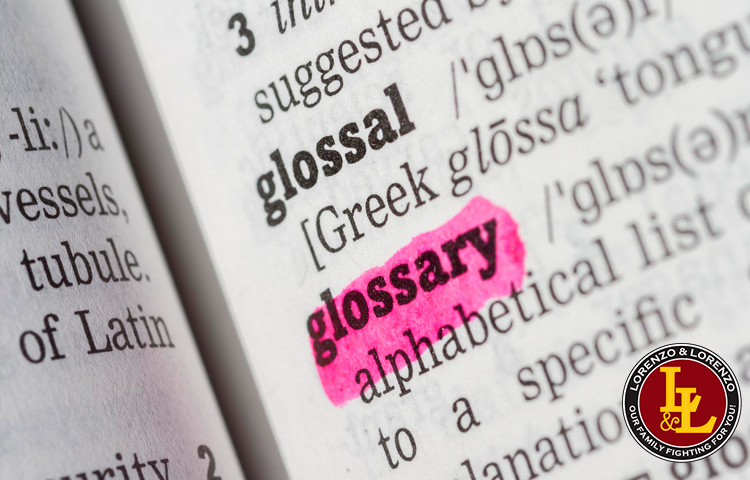
Commonly used accident and injuries vocabulary to know after an auto accident
Pursuing a car accident claim in Florida can feel like a maze of legal terminology. Tampa car accident lawyers at Lorenzo & Lorenzo explain confusing legal jargon to every client so that they understand their rights and don’t feel out of the loop. But not every accident attorney bothers to stop and explain what they mean like we do.
Whether you’re going with another law firm or you just want to get a running start on your car accident claim, you’re going to need a guide. This glossary of the most common verbiage, phrases and terminology you’re like to hear will give you a solid starting point:
- Adjuster is the person assigned by an insurance company to assess the validity of your accident claim. This individual will go through all the paperwork and decide if there’s a case to be made. If they believe your claim is valid, the adjuster will make an offer to settle. If they believe your claim isn’t valid for whatever reason, they will send you documentation explaining why your claim has been rejected. Remember that the adjuster works for the insurance company, NOT you. They aren’t your friend, no matter how much they may try to make it seem so. Their primary job is to reduce the amount the insurance company has to pay for your accident.
- Bodily Injury Liability denotes the part of an auto insurance policy that covers the physical injuries occurring in an accident. Most states (including Florida) require that car insurance policies have minimum cash value requirements for how much is covered.
- Counsel is the term describing your legal representative. Unless you’re representing yourself, this will be your lawyer or attorney.
- Damages is the legal term used to describe the compensation paid to the victim of an accident. Damages can be awarded as part of an insurance claim, a settlement or a judgment in a lawsuit. This compensation covers things like medical bills, loss of earning ability, the replacement of property and the costs of long-term care. They can also cover emotional trauma like pain and suffering.
- Defendant is an individual or company who is being sued because they are responsible for the events that led to an injury or accident.
- Deposition is sworn testimony prior to a trial. Expert witnesses are often deposed in car accident lawsuits, which allows both sides to nail down what claims they’re willing to support in regards to the incident.
- Discovery happens when a lawsuit moves forward. Both sides have the right to see what evidence the other has. This means your counsel can obtain information like cell phone logs and dash cam footage that may bolster your case.
- Duty of Care is a concept in American civil law that underpins most injury claims. The idea is that each person has a duty to ensure that others don’t come to harm due to the foreseeable consequences of their actions. A textbook example of this in car accident law is making sure the opposing lane is clear before making a left turn.
- Fault happens when a party is demonstrated to be the proximate cause of an incident. For example, a driver who failed to properly maintain the brakes on their car may be found at fault for a rear-end collision if it’s clear that an appropriately maintained vehicle would’ve stopped in time.
- First Party is the policyholder, usually the driver of a vehicle. Depending on the circumstances, it may also include passengers. Passengers are considered “third parties” if they choose to sue the driver of the vehicle they were in.
- First-Party Insurance Benefits are those benefits that your own policy awards to you in case you’re involved in an incident. When people speak of having “full coverage,” this is what they’re likely talking about.
- Loss represents the cash value attached to certain aspects of an incident. This can include the loss of property, earning potential, enjoyment of life, companionship or other things of value.
- Negotiation is the process that happens between a plaintiff’s counsel and the adjuster. If your attorney feels that the insurance offer is too low, they will make a counteroffer. This process can go back and forth for months.
- No-Fault Insurance is a type of coverage that ensures that injured first parties are covered for medical expenses, funeral bills and related costs arising from an accident. Fault doesn’t have to be proven for compensation to be awarded. In states that have no-fault rules in place (like Florida), plaintiffs must establish that their injuries were catastrophic before they have the right to sue in a third-party lawsuit.
- Plaintiff is the individual bringing a complaint to the court’s attention.
- Third Party is anyone besides the policyholder. This may include passengers in a driver’s car, pedestrians and other motorists or their passengers.
- Uninsured/Underinsured Motorist Coverage is a form of insurance some states require drivers to carry. UM/UIM insurance covers a first party based on their own policy if they end up in an accident with a driver who doesn’t have sufficient insurance to cover their injuries or who doesn’t have insurance at all.
Car Crash Guide: What to Do After an Auto Accident
Tips on what to do immediately after the crash and in the seconds, minutes and hours that follow.
We hope this glossary helps explain some of the common jargon you’re likely to hear in a car accident case in Florida. As we mentioned earlier, the team at Lorenzo & Lorenzo are happy to help explain your legal rights, Florida law, and what based legal phrases mean. Contact us to schedule your free consultation.







